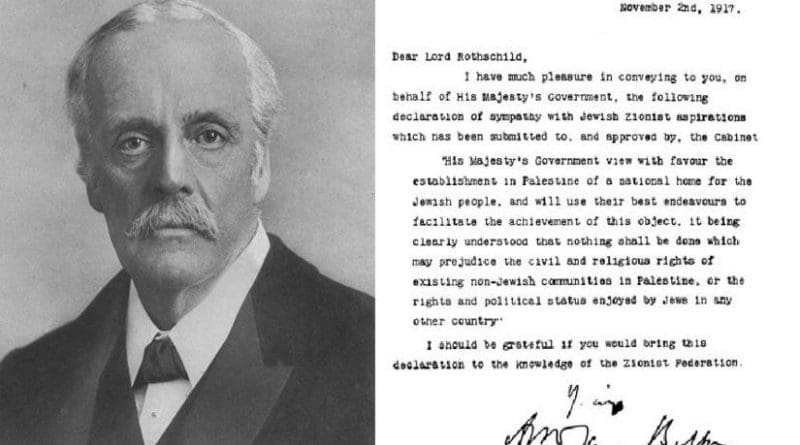85 Words That Destroyed Palestinian Dream – OpEd
By Ramzy Baroud
Some promises are made and kept, others disavowed. The Balfour Declaration, a promise made 100 years ago by the British Foreign Secretary to Jewish leaders in Britain, was honored only in part. A state for the Jewish people was indeed established, but that part of the declaration promising protection for the Palestinian people has been a sham for a century.
In fact, Arthur James Balfour, like many of his peers, was anti-Semitic. He cared little about the fate of Jewish communities. His commitment to establishing a Jewish state on land already populated by a thriving and historically rooted nation was meant only to enlist the support of wealthy Zionist leaders for Britain’s role in the First World War.
This is what Balfour wrote to the leader of the Jewish community in Britain, Walter Rothschild, on November 2, 1917:
“His Majesty’s government views with favor the establishment in Palestine of a national home for the Jewish people, and will use their best endeavors to facilitate the achievement of this object, it being clearly understood that nothing shall be done which may prejudice the civil and religious rights of existing non-Jewish communities in Palestine, or the rights and political status enjoyed by Jews in any other country. I should be grateful if you would bring this declaration to the knowledge of the Zionist Federation.”
As Balfour finished writing his infamous words, he must have been consumed with how effective they would be in enlisting Zionists to join Britain’s military adventures, in exchange for a piece of land that was still under the control of the Ottoman Empire. He clearly had no genuine regard for the millions of Palestinians — Muslims and Christians alike — who were to suffer the cruelty of war, ethnic cleansing, racism and humiliation over the next century.
Tamam Nassar, 75, is one of millions of Palestinians whose life Balfour scarred for ever. She was uprooted from her village of Joulis in southern Palestine in 1948. She was only 5.
Tamam now lives with her children and grandchildren in the Nuseirat refugee camp in Gaza. Weary of never-ending war, siege and poverty, she holds on to a few hazy memories of a past that can never be redeemed.
By the time she was born, the British had already colonized Palestine for decades, starting months after Balfour signed his declaration. The few memories peeking through the naïveté of Tamam’s innocence are largely about racing after British military convoys, pleading for candy.
She did not encounter Jews, or perhaps she did, but since many Palestinian Jews looked just like Palestinian Arabs she could not tell the difference, or did not care to make the distinction. People were just people. Jews were their neighbors in Joulis, and that was all that mattered.
Although the Palestinian Jews lived behind walls, fences and trenches, for a while they walked freely among the fellahin (peasants), shopped in their markets and sought their help, for only the fellahin knew how to speak the language of the land and decode the signs of the seasons.
Tamam’s house was made of hardened mud, and had a small front yard, where the little girl and her brothers were often confined when the military convoys roamed their village. Soon, this would happen more frequently and the candy that once sweetened the children’s lives was no longer offered.
In 1948, war changed everything. The battle around Joulis crept up all too quickly and showed little mercy. Some of the fellahin who ventured out beyond the village were never seen again.
The battle was bloody but brief. Poor peasants with kitchen knives and a few old rifles were no match for advanced armies. British soldiers pulled out to allow Zionist militias to attack, and the villagers were chased out.
Tamam, her brothers and their parents never saw their village again. They moved about in refugee camps around Gaza, before settling permanently in Nuseirat. Their tent was eventually replaced by a mud house.
In Gaza, Tamam has lived through wars, bombing, sieges and every persecution tactic Israel can muster. Her resolve is weakened only by the frailty of her ageing body, and sadness over the untimely deaths of her brother, Salim, and her son, Kamal. Salim was killed by the Israeli army while trying to escape Gaza after the Israeli invasion in 1956. Kamal died after being tortured in Israeli prisons.
If Balfour was so keen to ensure “nothing shall be done which may prejudice the civil and religious rights of existing non-Jewish communities in Palestine,” why is the British government committed to Israel after all these years? Are 70 years of Palestinian exile and 50 years of Israeli military occupation not sufficient proof that Israel has no respect for international law and Palestinian human, civil and religious rights?
As she grows older, Tamam returns to Joulis in her mind, often seeking a fleetingly happy memory or a moment of solace. Life under siege in Gaza is hard, especially for old people struggling with ill health and broken hearts.
The attitude of the current British government, which is preparing a massive celebration to commemorate the centenary of the Balfour Declaration, suggests that nothing has changed and no lessons have been learnt in the 100 years since Balfour made his ominous promise to establish a Jewish state. But this is also true for the Palestinian people. Their commitment to fight for freedom is also unchanged, and neither Balfour nor all of Britain’s foreign secretaries since have managed to break their will.
That, too, is worth pondering upon.

